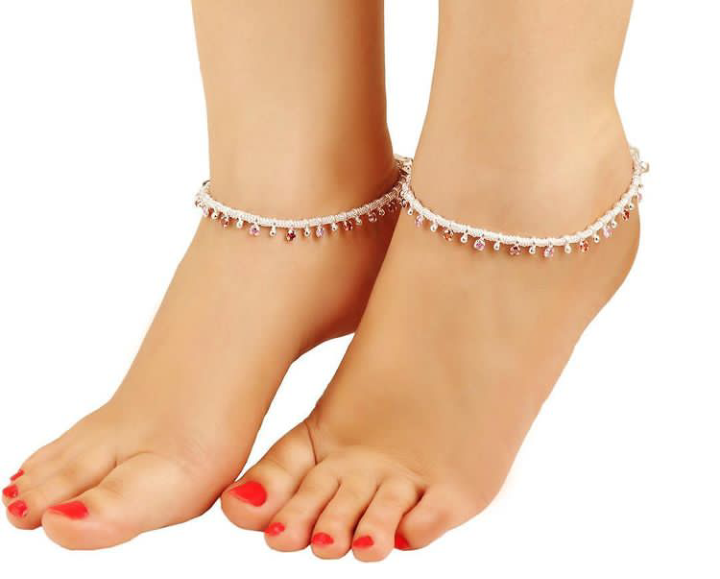Anklet, also called leg chain, ankle chain, ankle bracelet or ankle string, is an ornament worn around the ankle.
Anklets are important pieces of jewellery in Indian marriages. They are worn along with saris.
- Multi-billion naira confectionery opens in Kano
- Nigerians in Canada seek delayed implementation of new passport charges
They may be made from silver, gold and other less precious materials. Leather, plastic, nylon and other materials like these can also be used to make anklets
This ornament has come to be one of the most controversial fashion accessory worn by ladies in Nigeria.
While some see it as an ordinary fashion accessory, others consider ladies who wear them as ‘Ashewos’, a local parlance for commercial sex workers or lesbians.
This article discusses anklet from the socio-cultural perspective of the three major ethnic groups in Nigeria – Hausa, Igbo and Yoruba. These ethnic groups are popular and are known to have a rich culture. They have also been known to have done so much in the preservation of their cultural heritage.

Hausa
The culture of the Hausa people is largely dictated by Islamic practices. In fact, the parameters on which the Hausa people live is the doctrine of Islam. To the Hausa, a woman is free to wear anklets. But in doing so, she should not allow any other person, except her husband, see them on her. As Islam equally dictates, women should not equally wear anklets outside the confines of their matrimonial home. The basis for this instruction is derived from the Holy Quran. The Holy Quran forbids women to wear anklet bracelets outside of her husband’s house. It is forbidden for the anklet worn by women to jingle or produce sound to the hearing of non-Mahram men – those who are Islamically unlawful.

Anklets/InternetIt is written, “And let them not stamp their feet so as to reveal what they hide of their adornment. And repent to Allah all of you, O believer, that you may be successful.” {Quran 24:31}
The feet of a woman are part of her Awrah – parts of the body that Islam mandates to be covered. They should be covered from the sight of non-Mahram men. This is in line with the view of most Muslim scholars, may Allah have mercy on them. On the other hand, a woman is free to wear golden ornament of any kind. She can wear a wrist bracelet. She can wear an ankle bracelet or any other ornament of her choosing. She can wear them to any outing, provided that no alien man sees them or hears the sound they make. Despite this, there are Hausa ladies who wear anklets on their wedding day.
Igbo
Igbo women of Eastern Nigeria wear anklets. They do so during cultural dance, festivals and other major cultural ceremonies, such as coronations or chieftaincy conferment. The anklets worn by Igbo women are usually made with brass or beads. In some cases, it is mandatory for young maidens to wear anklets, because it makes them more fashionable. However, in the recent days, anklets are worn to exhibit social status of titled men and their spouses. In some parts of Igboland, elephant tusks are used to make anklets. Till date, anklets made from elephant tusks are worn by wealthy people. What this implies is that the wearing of anklets by ladies in Igbo land is done to express, if not, show prestige, beauty and wealth.
Yoruba
Bukola Adeyemi maintained in her book, Dress in the Making of African Identity that coral anklets were worn by Owo Chiefs – male and female – as insignia. Votaries and worshippers of deities also wear anklets as part of insignia of office and to identify them as children of spirits.
Kings and chiefs in Yoruba land equally wear beads. The wearing of beads by this group of people was not only ornamental but symbolic. A Yoruba adage goes: “Ade ori ni to oba; ileke ni ti awon ijoye,” meaning: kings are known for their crowns and chiefs for their beads.
Chains were broken a long time ago …

Anklets/Internet
Bliss Akinyemi, 26, revealed that she’ll wear an anklet anytime and anyday, not minding the many voices that keep whispering, “anklets were broken a long time ago.’ She continues:
“Whenever you decide to put on something on your own body, people are always going to find a way. It’s going to hurt them in a way that doesn’t concern them. Religion, culture, fashion, I’m not a fashion star. I’m not I will like to wear nice stuff and I just love having my anklet on. I love them.”
Bliss added that,“If I have my way I will probably wear two at a time. I know somebody will probably say that wearing shackles or something and they said the chains were broken a long time ago but we still put ourselves in bondage by wearing anklets. How? How does it translate? How does it relate? For me, anklets are just like any other thing like rings that you wear on your fingers like earrings in your ears. So, people wear them. Let them wear them.”
In her understanding of culture, she fires on and interrogates: “If you want to wear it for a cultural reason., you can say I’m a Yoruba person, and this is part of my culture and when you want to do your Yoruba cultural dance, you can wear anklets on your leg and stuff. So, is it only permissible for times like that? Why is it illegal or a crime or a sin?”
Bliss added that Christianity does not have any differing view regarding the wearing of anklets. It rather instructs followers to be modest. She reveals it this way:
“My religion say to be modest do not let your beauty to be of outworld or on your appearance. You see, the Bible is eternal, the world we live in is different and I don’t want to believe that the people in the Bible did not wear anklets or something. For me, it doesn’t take away the fact that I’m connected to God or that I’m a child of God, and I’m going make Heaven.”
Bliss further enlightens that there is no correspondence between wearing anklets and pleasing God. She says: “It doesn’t change that for me. You don’t have to wear anklets or not to be fit for the kingdom of God. There are a whole lot of things that can disqualify you. So why focus on menial things that don’t make sense. It’s my life I want to wear anklets and that’s why I wear them. All of these people having diverse opinions and views, of course, they are welcome as long as you are not imposing a law on what my own lifestyle should be.”
A symbol of lesbianism
Amina Oyegbade, 24, revealed that no modest lady/woman will ever put on an anklet as society will always look at her with disdain referring to her as a lesbian.
“Only lesbians wear anklets, no modest woman will tie a chain round her leg and refer to it as fashion, only lesbians do that.”

Mohammed Kaigama, 28, noted that “some females wear anklets for fashion, while others wear them to show that they are lesbians.”
Let’s leave anklets for what they are – as just fashion accessories. It is wrong to judge women for the choice they make on fashion accessories.



